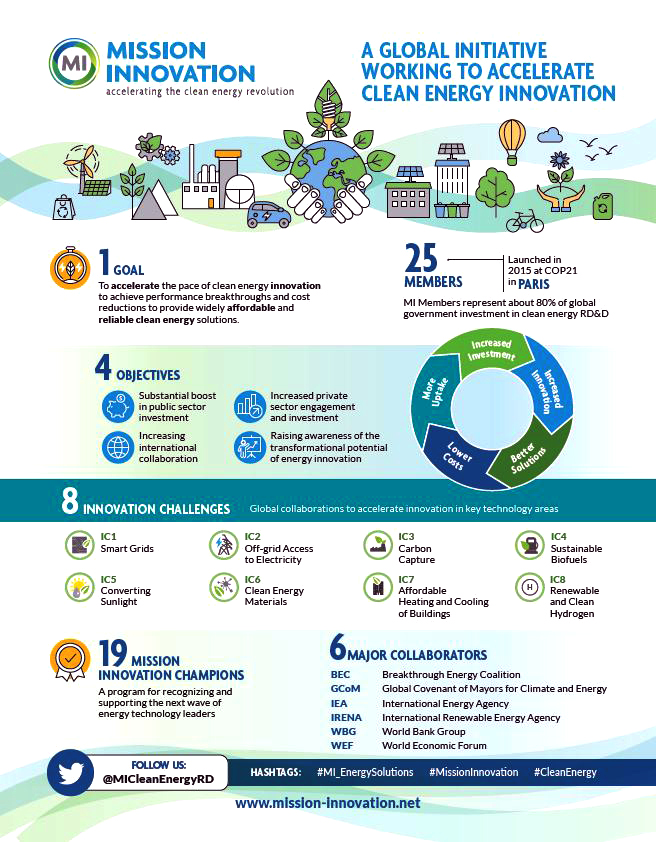Biodiversity & Environment
Mission Innovation 2.0
- 09 Feb 2021
- 6 min read
Why in News
Recently, the Union Minister of Science & Technology addressed the Mission Innovation (MI) to mark the beginning of phase-2 of the mission or Mission Innovation 2.0.
- India played a leadership role in MI Steering Committee and is a member of the Analysis and Joint Research and Business & Investor Engagement sub-groups.
Key Points
- Mission Innovation:
- Formation:
- Mission Innovation was announced on 30th November 2015, on the sidelines of the Paris Climate Agreement to undertake ambitious measures to combat climate change.
- Membership:
- It is a global initiative of 24 countries and the European Union to accelerate global clean energy innovation.
- Principle:
- Commitment by all members to seek to double their clean energy innovation investments over five years in selected priority areas.
- Each member according to its own priorities, policies, processes, and laws independently determines the best use of its funding and defines its own Research & Development priorities and path to reach the doubling goal.
- In many cases, MI members prioritise parts of their whole energy innovation budget within their baseline.
- Objectives:
- Enhance the public sector investment to a substantial level.
- Increased private sector engagement and investment.
- Increase international collaboration.
- Raising awareness of the transformational potential of innovation.
- Innovation Challenges (IC):
- Innovation challenges are a major part of the mission innovation that is aimed at leveraging research, development, and demonstration (RD&D) in technology areas that could ultimately result in effective ways to reduce greenhouse gas emissions, increasing energy security, and creating new opportunities for clean economic growth.
- There are 8 innovation challenges under the mission innovation:
- IC1 – smart grids, IC2 – Off-grid access to electricity, IC3 – Carbon capture, IC4 – Sustainable biofuels, IC5 – Converting sunlight, IC6 – Clean energy materials, IC7 – Affordable cooling and heating of buildings, IC8 – Renewable and clean hydrogen.
- The first phase has shown that work done under ICs have mobilized in a relatively short period, relying on members' leadership and voluntary efforts to advance IC objectives.
- These resources have dramatically accelerated the availability of the advanced technologies that will define a future global energy mix which is clean, affordable, and reliable.
- Formation:
- Mission Innovation 2.0:
- To achieve the shared goal of accelerating innovation, all the members have agreed to develop a second phase (2.0) that includes:
- An enhanced Innovation Platform building on current activities to strengthen the global clean energy innovation ecosystem and to accelerate learning.
- New public-private innovation alliances – Missions – built around ambitious and inspirational goals backed by voluntary commitments that can lead to tipping points in the cost, scale, availability, and attractiveness of clean energy solutions.
- To achieve the shared goal of accelerating innovation, all the members have agreed to develop a second phase (2.0) that includes:
- Indian Initiatives Aligned with the Mission:
- Clean Energy International Incubation Centre:
- To support the start-up innovation ecosystem, the Clean Energy International Incubation Centre established by the Department of Biotechnology, India under a Public Private Partnership model has played a crucial role.
- Increased Solar Capacity:
- India has increased solar installed capacity by 13 times and expanded its non-fossil fuel-based power generation to 134 Gigawatts, about 35% of total power generation.
- The National Solar Mission (a part of the National Action Plan on Climate Change) helped India to increase its solar capacity.
- India has embarked on an ambitious target of having 450 Gigawatts of renewable energy by 2030.
- India has increased solar installed capacity by 13 times and expanded its non-fossil fuel-based power generation to 134 Gigawatts, about 35% of total power generation.
- Biofuels:
- India is also working to considerably increase the proportion of the biofuel blend in petrol and diesel:
- Ethanol Blending Programme (EBP): It aims at blending ethanol with petrol, thereby bringing it under the category of biofuels and saving millions of dollars by cutting fuel imports.
- The 2018 Biofuel Policy has the objective of reaching 20% ethanol-blending and 5% biodiesel-blending by the year 2030.
- Five Centres of excellence in Bioenergy supported by Department of Biotechnology in India are working on both fundamental and translational research for advanced bio-fuels like biobutanol, biohydrogen and biojet fuels.
- India is also working to considerably increase the proportion of the biofuel blend in petrol and diesel:
- Ujjwala Yojana:
- Pradhan Mantri Ujjwala Yojana (PMUY) which is the world’s most extensive clean cooking fuel programme was launched in 2016 and is implemented by the Ministry of Petroleum and Natural Gas through its Oil Marketing Companies.
- Through PMUY, initially, 5 crores below poverty line (BPL) households were targeted for providing deposit free LPG connections to BPL households by 31st March, 2019. This target has been achieved.
- India has released around 150 million connections so far.
- Avoided Emission Framework for a sustainable future:
- India and Sweden under a partnership have developed an Avoided Emission Framework for a sustainable future.
- Under this partnership, eight companies have been selected to demonstrate an initial 100 million tons of potential CO2 emission reduction by 2030.
- Clean Energy International Incubation Centre:





